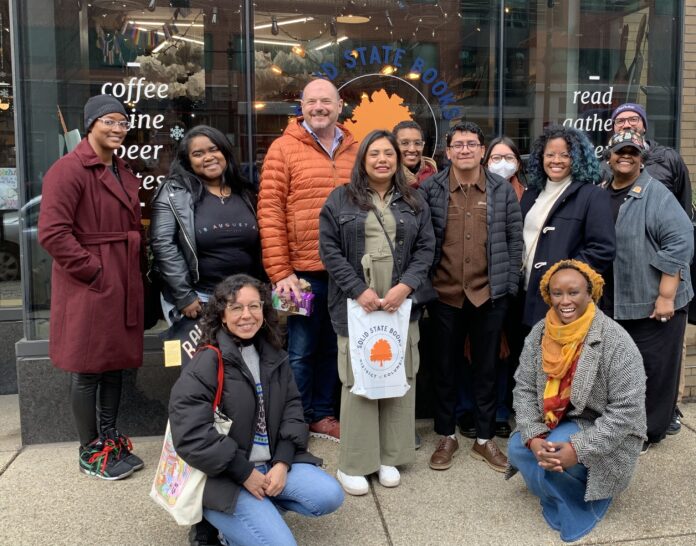In a phone interview, BincTank program director Ken White says, “Books are powerful, which is why they’re being banned in parts of the country. Books are ideas, culture, a shared catalyst for change. An independent bookstore is not just a store, it’s a community center where people gather, recharge, communicate, invest in words and points of view that may be different than one’s own.”
Spoken with assuredness, knowledge, and wisdom by a veteran in the literary industry—White expresses both his personal viewpoint and that of the Book Industry Charitable Foundation, most often referred to as BINC, the national organization for which he works. BINC was an outgrowth of an employee association of Borders, a multinational company that grew from its original store founded in 1971 in Ann Arbor, Michigan, to become a dominant force on the bookselling scene. With hundreds of stores worldwide, Borders, in the wake of the 2008 financial collapse filed for bankruptcy in 2010 and shutdown entirely in 2011.
Long before that day, beginning in 1996, the Borders Group Foundation was created to support company booksellers who encountered sudden financial emergencies. The funding came from voluntary paycheck deductions from employees, with matching contributions from the company. When Borders closed, the foundation wanted to ensure the funds remaining would not pay off debt, but would continue to flow to employees and their families. BINC in its earliest iteration supported recipients facing a plethora of ills that lead to financial distress, from natural disasters to domestic violence, funerals, divorce, mental health issues, housing instability, serious medical conditions, utility shut-offs and evictions.
When the pandemic hit booksellers like a sledge hammer in 2020, BINC was the perfect vehicle as the foundation shifted to become a safety net for booksellers who found themselves and their stores in unprecedented crisis. During the earliest months of the pandemic, the foundation in a two-and-a-half-month span distributed nearly $2.7 million, with the rate of individual grants increasing 443 percent over the year prior.
“The funds were like a grant, not a loan that had to be repaid,” White says. “The grants were tailored to individual need and had to be enough money so the problem wouldn’t spiral into other things. BINC had gotten credibility and had started raising funds when covid hit. Everybody stepped up and they were nimble and took in almost $5 million during the first 18 months of covid and gave away almost all of it. It was still March when our first checks went out—unlike the government assistance that took months and months to launch. And all of this was done with only a 3-4 person staff and some volunteers.”
White comes to his position at BINC with a long literary background that began in 1991 with his first job working at a bookstore while in college and includes participating in industry groups and serving a six-year term on the American Booksellers Association board of directors. Among the credits he likes to note is having produced with Maggie Takuda-Hall what he believes to be the first in-store drag queen storytime: an event held at Books, Inc. in the Castro, which he managed, in 2013 during Pride month.
In 2024, emerging from the pandemic with all sails raised, it’s clear from a new incubator pilot project White helms that the foundations shows no sign of reduced ambition. BincTank is designed to support new or nearly-new BIPOC-owned retail bookselling businesses located—and deeply invested—in their historically underrepresented community. The first cohort of 12 recipients drawn from a pool of 48 applicants was announced in February. Each bookseller will receive assistance in the form of industry-focused education; mentors and experts matched to individual participants; peer-to-peer networks, and access to business guidance, research and a resource library.
“Selection was highly competitive and we were extremely happy with the high quality of all of the applicants,” White says. “The cohort are already high achievers with vision: one of them is a state assembly person, another is a council member, a third focuses on Latin books, which is a hard sector and takes special organization, leadership, a person not waiting for things to happen.”
The selections were made anonymously according to predetermined rubrics; the primary criteria being did they demonstrate they had established support systems in the community, such as from a mayor or Black Chamber of Commerce member who would support their bookstore. “It wasn’t about did the judges like the idea behind a proposal, it was did they have community support built in, did they show they can function well with other people? They had to demonstrate how they could work with others, rather than stand alone. The judges didn’t know where they lived or the specific race the cohorts were. We used anonymity to eliminate as much bias as we could.”

White says that the impact of Black Lives Matter, George Floyd and other unarmed Black people killed or gravely injured by law enforcement officers, and social justice protests held worldwide, resulted in a “flurry of BIPOC independent bookstores.” Unfortunately, many stores were opening without the owners and staff having essential training, or lacking business plans, the ability to get loans, and connections to the book industry. “They were trying to do it on their own. We were seeing fun stories in the media when they opened…then a year later, small, sad paragraphs when they closed. We started gathering metrics about why a store succeeds and why it fails.”
The research revealed grim, but unsurprising realities. “We saw lack of generational wealthy, or weak infrastructure in their towns that meant people lacked good food, clean water, access to literature,” he says. “When you’re fighting to get the basics of life, you have less capacity to give to things that aren’t vital. If I’m thinking about where I’ll be living in a month or if my child will have clean water to bathe in or drink before they go to school, it’s harder to think about sustaining a business.”
The solutions found were more upbeat and are the basis of BincTank. Booksellers benefit from being surrounded by like-minded people. They find grounding and avoid isolation if the community resembles their own, share a common language or languages, have in their practice both emotional and practical support. BincTank is designed not to take over, but to be an intervention that removes barriers from the beginning of the small business cycle. The three-year pilot project is estimated to cost $1.1 million.
“Black business owners are 58% less likely than white business owners to look for support outside of their business, like asking for money from a trade association rather than a bank. Bank loans to Black-owned business owners have three times the chance of denial compared to a white business owner. People who identify as BIPOC have learned to mistrust the book and publishing industry. It could be real or perceived, but it’s never been super representative or an accurate profile of this country. When I was on the board of the American Booksellers Association, not to over focus on them because they do many, many, wonderful things, I was the only person of color and queer person. I am Filipino and Hispanic and identify as QTPOC.”
The 2024 entrepreneurs recently gathered in Washington, DC, visiting BIPOC-owned stores and launching the project. The first cohort includes Angie Nixon (Jacksonville FL), Kenya Kirkman (Brooklyn NY), Rob Eckman (Belleville Il), Ashley Mireles-Guerrero (Fresno CA), Courtney Bledsoe (Chicago Il), Kevin Zambrano (Brooklyn NY), Diana Dominguez (Springdale Ark), Aysia Brown (Fontana CA), Gwendolyn Henderson (Tampa FL), Jay Williams (Detroit MI), Alma Guzman (Los Angeles CA), and Ciona Rouse (Nashville TN).
In addition to its own training programs, BincTank is partnering with the Professional Booksellers School based in Westbury, NY, an organization that has an established certification program for booksellers. White says they’ve reserved spaces in their workshops and classes for BincTank participants and that additional associations with trade organizations and groups supporting incubator initiatives are being explored. For now, the plan is to fully invest in the first cohort, which doesn’t preclude future dreaming. “I’d like to go from 12 people in a cohort to 24, 48, who knows?” White says. “Possibly we’d expand from focusing on BIPOC owners to sharing that focus with LGBTQ+ owners, which some of the first cohort are already. The primary thing is for BincTank to grow with the vision we already have: To help as many owners as we can.”






